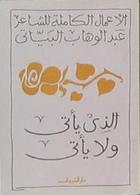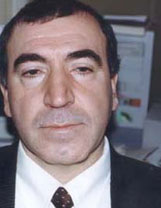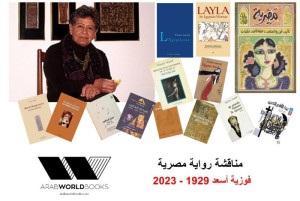Abdul Wahab Al Bayati 1926 - 1999
His diwan الذي يأتي ولا يأتي was our book of the month in September 2005.
More information on the poet and his work can be found on the book's page.
Iraqi poet who “led Arabic poetry beyond the constraints of classical Arabic poetical forms, transcending the traditional rhyme schemes and conventional metric patterns that had prevailed for more than 15 centuries.” He tried to create a Renaissance for his people, his innovative poetry reflected a wide range of interests and his mind sought new frontiers. The Broken Jugs, his collection “formed the basis of Arab poetry’s modernist movement.”
His life was a story of flight and exile; he spent much of his life outside his homeland. He always dreamt at night that he was in Iraq.
He died of a heart attack in Damascus where he was buried.
Abdul Wahab Al Bayati 1926 - 1999
Points of reference by Ahmed Abdel-Moeti Hegazi
Al-Ahram Weekly, 12-18 August 1999
I knew Abdel-Wahab Al-Bayyati for more than 40 years. And strangely, given the peripatetic nature of his life, we met for the first and last time in Cairo. I was 22 years old and he 31 when, in the winter of 1957, we met for the first time. The last time was earlier this year, when we both participated in a symposium held at the Cairo International Book Fair to celebrate 50 years since the emergence of free verse in Arabic.
The last time I spoke to Al-Bayyati, though, was a few weeks ago, when I was in Paris, invited by the Institut du Monde Arabe to coordinate a festival of Arabic poetry scheduled for March next year. I suggested that a committee be formed bringing together people who might contribute to the success of such an event, and took it upon myself to contact Mahmoud Darwish, André Michael (the Arabic literature professor and head of the College de France), Gamaleddin Ben Sheikh and, of course, Al-Bayyati. We spoke over the telephone -- I in Paris, he in Damascus -- and he was full of energy as usual, and was as quick as ever to comment on the symposium in which we had both participated, and on the controversy that had ensued.
Between our first and last meeting a great many miles have, of course, been covered. And for many of them we were fellow travellers, for I accompanied Al-Bayyati on many journeys, and visited him in many of the different places he would occupy -- the hotels and institutions, cafés and airports where he set up his temporary residence.
During his first stay in Cairo -- a stay which lasted for several months -- Al-Bayyati would come often to the offices of Rose Al-Youssef magazine, where he would invariably find Hassan Fouad, Salah Abdel-Sabour, Salah Jahin, Ahmed Bahaeddin and myself, or else we would meet in a café, restaurant or the hotel, usually with fellow writers or mentors such as Ihsan Abdel-Quddous, Kamel El-Shinnawi, Louis Awad and Naguib Mahfouz.
This early acquaintance was interrupted by the July 1958 Revolution in Iraq, and we only resumed seeing each other when he left Moscow for Cairo in 1964. Then our relationship slipped easily into an earlier pattern -- a daily meeting in one of the downtown cafés, usually Café Riche or Lappas, and a night out once or twice a week, which would last till dawn.
Al-Bayati's second stay in Cairo forged a unique link between him and Egypt, far more than that of a guest -- or even a refugee -- in a host country, or the one that was offering asylum. In the 1970s I left Egypt for Paris, while Al-Bayyati returned to Iraq, only to leave again, this time to Madrid as a cultural attaché. From the mid-1970s to the late 1980s we would meet in Paris, Madrid, London and Delphi in Greece. And in each of these cities we would resume the life that we had led in Cairo. As for the last few years, they found us meeting in Jeddah, in Dubai, Masqat, Beirut and Cairo. And now we shall never meet again, in any of the world's capitals, for Al-Bayyati has left, never to return.
His final journey did not come as a complete surprise to me, though he was neither excessively old, nor had he been suffering any serious illness. Perhaps he could have lived several more years, had he not insisted on continuing with the daily routine to which he had adhered since he was 30, occupying the places he had chosen in his favoured cafés, whatever the city.
Certainly, he was a man of fixed habits: in every city he had a favoured café. Once chosen, the café remained fixed, and it was there that he would smoke and read the papers, meet his friends and meditate until it was time for him to rest, regaining his energy for the long night ahead. For half a century he remained faithful to this routine, a routine sufficiently flexible to accommodate the many journeys, the celebrations and the conflicts, that punctuated his life.
Indeed such battles, such celebrations, were an inevitable part of the manner in which Al-Bayyati lived his life, for he was a man who wrote, spoke, attacked his rivals and defended himself before going to bed. And in the morning he would wake to reap all that he had sowed the day before -- the friendships, enmities, losses and gains which nourished his daily programme, and which he would resume with relish.
Throughout the constant movements of his life Al-Bayyati's body remained faithful. He did not fall ill, nor did he suffer much physical pain. His constitution was perfectly adapted to his habits. The only time, perhaps, his body took him by surprise was the last time when, in his sleep, he exhaled a final breath. It was almost as if his body was too frightened to ask him permission to leave or retire, lest Al-Bayyati should deny that final release.
There are some things about Al-Bayyati's life that will always appear mysterious to me, not least the manner in which he managed family relationships. It seems, in hindsight, almost as if he had signed a contract with his family, with his wife and children, that they would share his name, and the admiration that he engendered, and in return they would grant him permission to lead the life he wished to lead, in Cairo or Moscow, Baghdad or Madrid. If only all poets could attain such a situation.
In a piece such as this, I find myself wondering whether I should write more on Al-Bayyati's poetry -- and though I know this is probably the case I find it impossible to ignore the friendship I forged with the man, as much as the poet, a friendship that spanned four decades. And so I have resolved to leave any lengthy discussion of his work to others, to those critics who know only the work and are therefore capable of a greater objectivity than I. But I, who knew the man as much as the poet, find it impossible to rid myself of that knowledge, just as I find it impossible to ignore. Nor do I believe, for a moment, that Al-Bayyati was always the same person, or always the same poet.
Al-Bayyati the young man was, after all, very different from Al-Bayyati the old man, just as the 1950s poet is very different from the poet writing in the 1970s or 80s. But I am no critic. I am a poet who looks at other poets' work from the perspective of my own, and take what I would best like to write as a standard, a basis on which to judge what I read. And I am a man with my weaknesses and strengths, advantages and defects, like all other men.
How then can I be objective about Al-Bayyati and his poetry, when I know for a fact that Al-Bayyati himself was never objective with anyone, not even with himself, and certainly not with other poets?
But objectivity, in the end, was never really an option for those who lived through the period in which Al-Bayyati lived.
He was not the first pioneer of modernism in the Arabic poetry movement, being preceded by Egyptians, who drifted away from poetry to other occupations, such as Ahmed Zaki Abu Shadi, Khalil Shayboub, Ali Ahmed Bakathir, Louis Awad and Abdel-Rahman El-Sharqawi, as well as Iraqis such as Nazik Al-Mala'ika and Badr Shakir Al-Sayyab. Amongst his compatriots, Al-Mala'ika, born in the early 1920s, suffered the strange fate of being viewed as a veteran since she achieved renown so early in her career and so, perhaps, among them all, it is to Al-Sayyab that the credit for championing free verse must go, a credit which he deserves by virtue of his great talent and the brilliance of his more mature poetry. Yet Al-Sayyab's initial experiments were of average quality, and his early withdrawal from the ranks of Iraqi communists triggered a vicious campaign directed against him. A vacuum was left which Al-Bayyati, by dint of both his poetry and shrewdness, managed to fill.
Al-Bayyati thus came to prominence in those strange years, the 1950s, years which overflowed, as he himself once said, with real poets, impostors, forgotten heroes, victims, as well as falsifiers of history and hacks. How then do we subject Al-Bayyati to any objective interpretation? How do we separate the work from an image that was first propagated, that first came to public attention, in the 50s? How do we view a poetry that changed in the light of a myth that has remained?
The 1950s are Al-Bayyati's glory years, a decade in which his language matched his movement and his prophesies were consistent with his times. In Al-Sayyab he had a rival, whose shadow was constantly on the retreat, and in every other respect he was treated with sympathy and surrounded by admiration. And in my opinion these were the years in which Al-Bayyati wrote his best poems -- simple works, admittedly, but works which are imbued with the heroism of the times, a time with which he was perfectly in harmony. Even if his subsequent poems appear to be more mature and profound, more laden with signs and symbols, they seem often to be fabricated, more painfully, self-consciously constructed.
When we used to meet, particularly if it was late at night, I could not help but recall a beautiful poem of his, a poem that I have known by heart since first I heard him recite it more than 30 years before:
Like a drop of rain,/I was alone,/My love, like a drop of rain./Do not be sad./Tomorrow I will buy you the moon,/The forenoon sun /And an orchard./Tomorrow if I return from my travels,/If the rock in my breast buds./But today I am alone,/My love,/Like a drop of rain.
Based on a simile, a single, simple, inspiring simile, it has no trace of ostentation or false grandeur. But despite its simplicity, the image remains extraordinarily rich, a complex evocation of solitude, isolation and purity, a wonderfully succinct way of encapsulating so many aspects of the human condition. Al-Bayyati manages in a few phrases to invoke not just the melancholic mood inspired by the rain, to suggest the alienation of being lost in a foggy city far away from home, but to do so in lines of quite startling purity.
In this poem and in others written during the 1950s, Al-Bayyati's art, in my view, reaches the highest degree of perfection. But the perfection of art is closely bound up with the circumstances that produced it, and they were circumstances that would change in the 1960s and 1970s, years in which the poet would alter his language, and allow artifice and fabrication a place.
Is it, perhaps, the deceptions of those later years that crept in to the poet's language, that began to inform much of his verse? I want, really, to say that Al-Bayyati the poet is but one aspect of a myth. And the role he played in our lives is not restricted to his poetry but impinges on the cultural and intellectual tenor of our times. Al-Bayyati, then, is more than his poetry, he is an emotional reference, a coordinate whose absence will make it more difficult than ever to navigate our lives.






